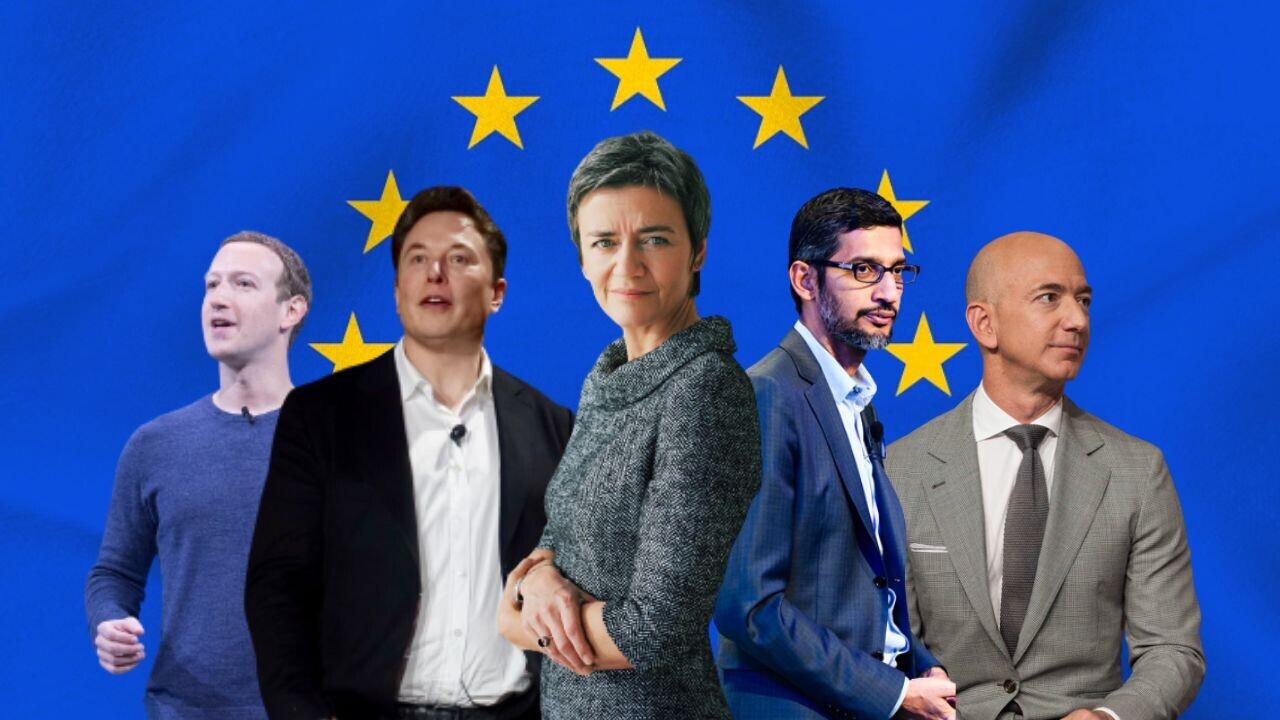
The European Union is on a mission to curb the power of big tech. In recent years, the bloc has doled out vast antitrust fines to Silicon Valley giants, set global standards for data privacy, and proposed a raft of digital regulations. Yet critics say the rules have been ineffective.
Analysts claim the legislation has failed to protect competition, while giving companies routes to avoid enforcement. In 2023, the bloc has grand ambitions to change that.
A key component of the plans is the new Digital Markets Act (DMA). The landmark legislation prohibits platforms from ranking their own products more favorably than those of third parties, and from processing data collected from different services. Fines for single infringements can reach 10% of the offenders’ global turnover, and up to 20% for repeated violations. In May 2023, the new rules will start to apply.
The act is the cornerstone of two complementary objectives for the EU: reducing big tech’s dominance and fostering European challengers.
To find out how these plans will unfold next year, TNW asked an array of tech experts for their predictions for 2023.
Building competition
The impact of the DMA was a common topic in our experts’ forecasts. Amandine Le Pape, COO of secure messaging and collaboration app Element, and Matthew Hodgson, technical co-founder of the Matrix open standard, both lobbied for the regulation. The duo is optimistic about the impact on competition.
“Big tech is being forced to embrace interoperability, which will unleash a new era of innovation,” said Le Pape. “Consumers and businesses will have more choice, better features, and improved privacy. Messaging is finally catching up with the openness of the web and email.”

Hodgson, meanwhile, pointed to the effects on opening up access.
“The DMA stipulates that big tech must open up its APIs to enable widespread interoperability,” he said. “It’s a huge step forwards, but the best interoperability comes from a widely adopted open standard rather than a tangle of bridges — as demonstrated by both the web and email.”
“The DMA will force a change in behavior.
Supporters and opponents alike agreed that the DMA will have deep repercussions. Geoff Blaber, the CEO of analyst firm CCS Insight, envisions its influence extending far beyond European borders.
“We predict that the DMA will force a change in behavior from large tech players in Europe that is likely to ripple through business operations globally,” Blaber wrote in a recent report. “It will also further motivate US politicians keen to avoid a scenario in which Europe defines the antitrust agenda without US involvement. A degree of harmony and consistency between US and EU legislation would be a clear advantage but is by no means assured.”
Making business plans
Increasing competition could leave gaps for European challengers to enter. The EU, however, has historically struggled to turn its world-leading research into big tech companies.
One barrier is the notoriously slow and inefficient transfer of IP from academia to the economy. This problem is illustrated by the EU producing more research papers than the US, but turning far fewer into commercial applications.
According to Luigi Congedo, a venture capitalist and Innovation Advisor at marketing firm Clarity, this weakness can be reduced by changing the EU’s investment framework. This, he argues, could stimulate a more effective technology transfer — and prevent promising startups from being acquired by Silicon Valley giants.
“We need to create our Google, Facebook, and Microsoft, and, in order to do it, create a better environment to compete and do business across the continent,” he said. “If we fail in creating a real European platform for innovation and instead maintain the current ‘country-based model,’ all our emerging businesses will end up becoming M&A targets for American multinational companies.”
“I expect more openness.
Another issue for tech businesses in the EU is integration across member states. Companies have long complained about the complexity of navigating the union’s tax and employment requirements. Congedo predicts the bloc will address these challenges.
“I expect more openness to make recruitment and hiring easier across states, and also for foreigners like American businesses to hire in the EU,” he said.

Deeper tech
In its effort to nurture homegrown businesses, the EU has targeted legislation at specific areas of tech. A notable example is the European Chips Act. Proposed in February 2022, the framework aims to encourage semiconductor production in the union.
As of 2022, Europe accounts for less than 10% of the global production of semiconductors. The European Commission wants to ramp that up to 20%, by plowing €43 billion into the sector.
Mark Lippett, CEO of chip specialist XMOS, has mixed expectations for the legislation. While he welcomes the investment, he’s worried that the bloc will wrap the sector in red tape.
“Providing funding for businesses in a supply-threatened environment offers some obvious fail-safes in times of trouble,” he said. “However, EU projects can become somewhat mired in bureaucracy, and the velocity can be sucked out as a result.”
“This will help fuel innovation.
Another focus area for the EU is artificial intelligence. The European Parliament is currently finalizing its flagship AI Act, which will place stringent rules on high-risk artificial intelligence systems.
IT companies hope the legislation boosts European innovation. Matt Peake, Global Director of Public Policy at Onfido, an ID verification firm, believes it could provide regulatory clarity, without the burdens of excessive compliance and operational costs.
“This will ultimately help fuel innovation in AI, which helps to reduce bias, and drive more inclusive online services,” he said.
Ultimately, the EU hopes to stimulate innovation by leveling the playing field. It’s an approach that’s attracting imitators around the world.
“The question is whether innovation is best fostered broadly through open competitive marketplaces or determined by a minority of platforms operating at significant scale,” said Geoff Blaber, CEO of CCS Insights. “Consensus has undoubtedly shifted to the former.”
Get the TNW newsletter
Get the most important tech news in your inbox each week.




